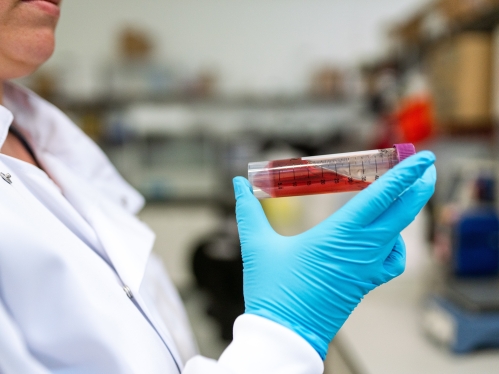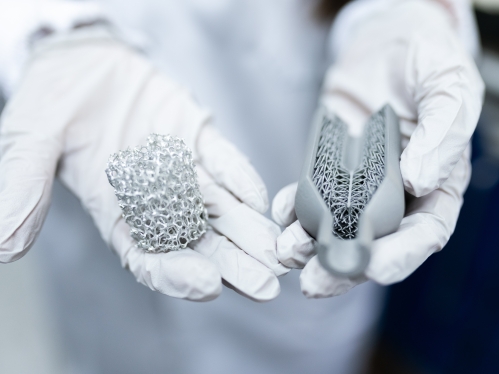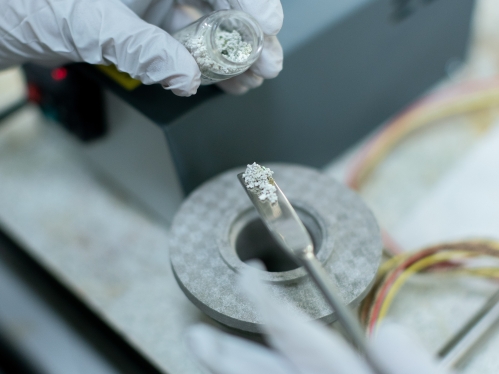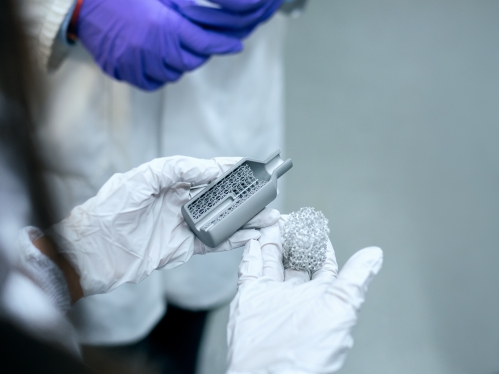Doctoral Degree in Chemical and Biochemical Engineering (Ph.D)
Rutgers School of Engineering’s research-driven doctoral program in Chemical and Biochemical Engineering is focused on original contributions to the fundamentals and applications of chemical and biochemical engineering. Program graduates are well-positioned to pursue careers in academia, industry, research organizations, and engineering firms.
Applied Learning
Doctoral students are expected to be capable of top-quality independent work and research. All candidates are required to spend two semesters as teaching fellows, as well as complete and defend a final dissertation research project. Doctoral candidates additionally benefit from the close research ties and connections with industry leaders that result from Rutgers’ location at the heart of New Jersey’s industrial corridor.

CBE Curriculum Highlights
The doctoral degree is essential for those planning careers in research and/or academia. Dedicated to the development and education of future leaders in the dynamic, evolving field of chemical and biochemical engineering, our distinguished faculty provide students with the up-to-the-minute information and cutting-edge skills for career success. We offer:
- Core chemical engineering courses in:
- Advanced Chemical Engineering Thermodynamics
- Advanced Transport Phenomena I: Momentum Transfer
- Advanced Transport Phenomena II: Heat and Mass Transfer
- Kinetics, Catalysis, and Reactor Design Analytical Methods in Chemical and Biochemical Engineering
- Electives in a wide range of topics from multiple areas in chemical and biochemical engineering
- Developmental courses in:
- Teaching in the Engineering Curriculum
- Graduate Seminar
- Practical training, including industrial internships
- An option in pharmaceutical engineering that trains future leaders in next-generation pharmaceutical product design and manufacturing

Doctoral Degree Requirements
- 72 credits, including 30 course credits and 24 research credits
- Oral preliminary exam
- Dissertation proposal and defense
- Teaching experience gained through two semesters as teaching fellows

Academics and Research
- Cross-disciplinary researchers from major universities come together at centers such as the Center for Structured Organic Particulate Systems (C-SOPS), which is improving how pharmaceuticals and other products are manufactured, and the Catalyst Manufacturing Center.
- Cutting-edge equipment includes Raman spectrometer with confocal microscope, gas-phase kinetic reactors, high-performance imaging systems, and thermogravimetric analyzer, along with advanced computational resources and software systems.
- Research from our CBE programs results in publication in leading journals; patented technologies; and extensive funding from state, national, and international sources, as well as from industry partners.





Doctoral Degree Course Requirements
-
- 155:501 Advanced Transport Phenomena I
- 155:502 Advanced Transport Phenomena II
- 155:507 Analytical Methods in Chemical & Biochemical Engineering
- 155:511 Advanced Chemical Engineering Thermodynamics
- 155:514 Kinetics, Catalysis, and Reactor Design
-
- Chemical & Biochemical Engineering curriculum. Students take 6 credits of chemical engineering electives (500+ level courses offered within the CBE department), and 9 credits of technical electives (essentially any 500+ level mathematics, science or engineering course, including CBE). It is recommended that within these 9 credits of technical electives are included 3 credits of a life science elective.
- Pharmaceutical Engineering curriculum. Students take 5 pharmaceutical engineering courses for the 15 credits of electives. Appropriate pharmaceutical engineering courses include:
- 155:541 Pharmaceutical Materials Engineering
- 155:544 Pharmaceutical Organic Nanotechnology – Drug Delivery
- 155:545 Pharmaceutical Process Design I (Synthesis, Separation and Sterile Processing in the Pharmaceutical Industry)
- 155:546 Pharmaceutical Process Design II (Pharmaceutical Unit Operations)
- 155:547 Statistical Analysis and Design of Pharmaceutical Operations
- 155:548 Advanced Topics in Pharmaceutical Engineering
- 155:549 Advanced Engineering Pharmaceutical Kinetics, Thermodynamics, and Transport Processes (Pharmaceutical Development, Administration and Absorption)
- Chemical & Biochemical Engineering curriculum. Students take 6 credits of chemical engineering electives (500+ level courses offered within the CBE department), and 9 credits of technical electives (essentially any 500+ level mathematics, science or engineering course, including CBE). It is recommended that within these 9 credits of technical electives are included 3 credits of a life science elective.
-
- 155:605 Teaching in the Engineering Curriculum (1 credit)
- 155:601/602 Graduate Seminar (1 credit) taken a minimum of 4 semesters
Other courses may be substituted with permission of the Graduate Program Director.
Maintaining a cumulative grade point average of at least 3.0 with no more than one (1) grade less than B in the core course is required.
Petition for transfer of up to twenty-four course credits (8 courses) of graduate courses from other schools or from an undergraduate record (provided the credits were not used to satisfy undergraduate degree requirements) may be made to the Graduate Program Director after completion of twelve graduate credits at Rutgers.